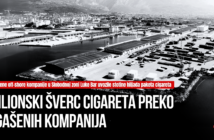The Investment and Development Fund (IDF) approved favorable conditions for as many as 11 programs of financial support implemented in the election year 2016, in the finish of the latest parliamentary election campaign. Special benefits were mostly provided in the northern region of the country, which is a rather underdeveloped area, shows the analysis of MANS Investigation Center and the daily “Dan”.
September this year IDF adopted decision on lowering the interest rate for infrastructure, catering, hotel and wood processing projects from 5 percent to 4.5 percent, while for the same projects implemented in the north and less developed municipalities (Cetinje, Niksic and Ulcinj), it further reduced the interest rate by another 0.5 percent. When it comes to loan processing fee, it was reduced to 0.6 percent, compared to the beginning of 2016 when it stood at 0.75 percent.
The head of the Fund is Zoran Vukcevic, publicly known from the affair “Tape Recording”, which started in 2013 and refers to the transcripts from meetings of party bodies of the Democratic Party of Socialists (DPS) held on the eve of the early parliamentary elections in 2012. The highest officials of the DPS revealed then some of the mechanisms that had been used in pre-election periods, such as welfare payments, severance payments, loans or employment.
In addition to the decision which was made shortly before the parliamentary elections, at the beginning of May this year, before opposition controllers joined the government of electoral trust, the IDF adopted the decision on changing four credit programs, which envisaged more favorable conditions for beneficiaries, or that they may provide their own participation within one year from the date of conclusion of the loan agreement.
Those are programs to support the development of entrepreneurship, the crediting of young people in business, start-ups or university graduates. The IDF envisaged providing financing of up to 70 percent of the total investment, while the beneficiaries had to provide 30 percent of its share.
However, just before the opposition controllers entered in May, the Board of Directors of the IDF amended the four loan programs which loosened the criteria, and enabled beneficiaries to provide their 30 percent share within a year from the date of conclusion of the loan agreement.
Moreover, the analysis of MANS Investigation Center and the newspaper “Dan” showed that the IDF’s overall lending conditions in the election year of 2016 were more favorable compared to 2015, which was a year without elections.
Thus, in 2016, borrowers could take the maximum amount of three million, with a repayment period of up to 12 years, a grace period of four years, the interest rate of 5.5 percent per annum and a fee of one percent of the total amount of the approved loan (the interest rate and loan processing fee were further reduced for 11 programs in September, as mentioned earlier in the text).
A year earlier, loans were also granted for a period of three years and with one percent fee. However, the repayment period was shorter – up to ten years with a grace period of two years, while the interest rate was substantially less favorable and amounted to seven percent.
Operations in secrecy
On the official website of the IDF, the operations of which are shrouded in secrecy, showed that €53.3 million of different loans was allocated until the middle of November 2016 million.
According to the data presented, it follows that around €3.6 million relates to agricultural loans (purchase of agricultural equipment, machinery, production expansion, purchase of livestock …), which are allocated to 112 beneficiaries.
What is not known is how much was allocated in the pre-election period, as the IDF hides the data and refuses to provide information in accordance with the Law on Free Access to Information.
Authors:
Marko Vesovic
Ines Mrdovic
This text is created with the support of the European Union and the U.S. Embassy Podgorica. Network for Affirmation of Non-Governmental Sector – MANS is solely responsible for the contents of this article, and the views taken herein shall not in any case be considered as those of the European Union.



